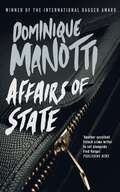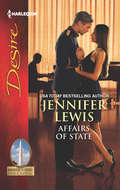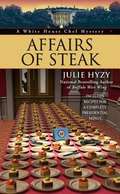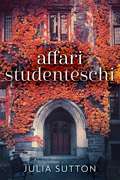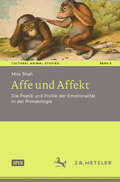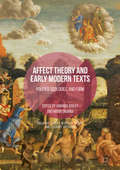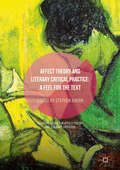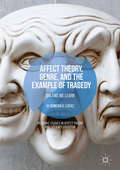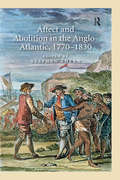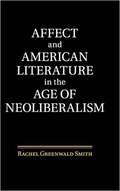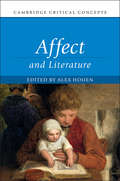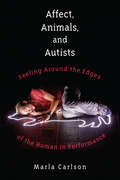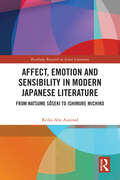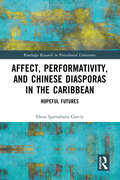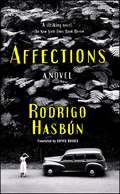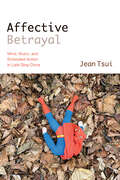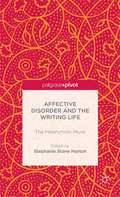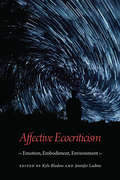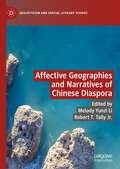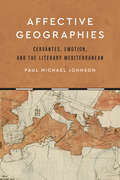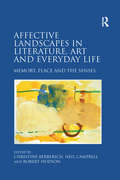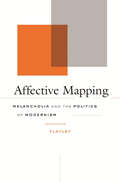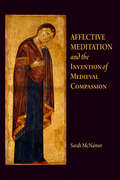- Table View
- List View
Affairs of State
by Dominique ManottiDominique Manotti is back on form with a tale of intrigue and corruption. A call-girl whose black book lists her elite international clients is found murdered in an underground garage; a plane bound for Iran laden with illegal arms disappears from the skies over Turkey, and the president's closest adviser Bornard, head of a controversial Elysee security unit, manipulates the system with consummate ease - and illegality. Until the day when rookie investigator Noria Ghozali determines to untangle the threads which bind these events together. In doing so she penetrates the Elysee's innermost system, confronts the workings of money and corruption within government, and in the process is forced to combat the institutional - and overt - racism which repeatedly stalls her.
Affairs of State
by Dominique ManottiDominique Manotti is back on form with a tale of intrigue and corruption. A call-girl whose black book lists her elite international clients is found murdered in an underground garage; a plane bound for Iran laden with illegal arms disappears from the skies over Turkey, and the president's closest adviser Bornard, head of a controversial Elysee security unit, manipulates the system with consummate ease - and illegality. Until the day when rookie investigator Noria Ghozali determines to untangle the threads which bind these events together. In doing so she penetrates the Elysee's innermost system, confronts the workings of money and corruption within government, and in the process is forced to combat the institutional - and overt - racism which repeatedly stalls her.
Affairs of State
by Jennifer LewisAmerican RoyaltyFirst she discovers she's the secret daughter of the American president, then she falls for a British prince. Ariella Winthrop's life can't get much more complicated. Or can it?Having fun with Simon Worth-passionate meetings, hiding their attraction from the public-is one thing. But getting serious? The British monarchy certainly doesn't want their beloved prince dating an American, much less one with her fair share of scandals. But when Ariella discovers she's pregnant with a royal baby, all bets are off. This woman is fighting for what is hers.
Affairs of Steak
by Julie HyzyWhite House chef Olivia Paras and her arch nemesis, White House Sensitivity Director Peter Everett Sargeant, must work together to solve the double murder of one of the First Lady's assistants and the Chief of Staff-before they become the next victims of a merciless assassin with a secret agenda.
Affari Studenteschi
by Julia SuttonAffari studenteschi racconta le storie ed i processi di cinque studenti durante il loro secondo anno all'Università di Chattlesbury. E' una storia di speranza, ambizioni, sogni ed amore. Ma andrà tutto liscio per il rebelle Will, la talentuosa Evelyn, la coraggiosa Anne, la romantica Juliette e la resiliente Sophie? Scopri la terza parte della serie "La scuola dei sogni".
Affe und Affekt: Die Poetik und Politik der Emotionalität in der Primatologie (Cultural Animal Studies #6)
by Mira ShahDiese Open-Access-Publikation mit dem Titel "Affe und Affekt" untersucht anhand populärwissenschaftlicher Forschungsmemoiren die Form und Funktion von Emotionen, Affekten und Gefühlen in der Feldforschung mit Affen – und wie gerade Literatur und Film das Verhältnis von Mensch, Affe und Affekt für die Wissenschaft produktiv reflektieren und analysieren. Der Mensch ist evolutionär betrachtet ein Affe unter anderen. Doch nennt er sich selbst homo sapiens, die anderen Affen im besten Fall die ‚Menschenaffen‘ - sonst aber pans, pongos oder papios. Diese Unterscheidung ist nur ein kleines Puzzlestück in einer emotionsgetriebenen Rhetorik der Primatologie, der Wissenschaft von den Affen.
Affect Theory and Early Modern Texts: Politics, Ecologies, and Form (Palgrave Studies in Affect Theory and Literary Criticism)
by Amanda Bailey Mario DigangiThe first book to put contemporary affect theory into conversation with early modern studies, Affect Theory and Early Modern Texts: Politics, Ecologies, and Form demonstrates how questions of affect illuminates issues of cognition, political agency, historiography, and scientific thought in early modern literature and culture. Engaging various historical and theoretical perspectives, the essays in this volume bring affect to bear on early modern representations of bodies, passions, and social relations by exploring: the role of embodiment in political subjectivity and action; the interactions of human and non-human bodies within ecological systems; and the social and physiological dynamics of theatrical experience. Examining the complexly embodied experiences of leisure, sympathy, staged violence, courtiership, envy, suicide, and many other topics, the contributors open up new ways of understanding how Renaissance writers thought about the capacities, pleasures, and vulnerabilities of the human body.
Affect Theory and Literary Critical Practice: A Feel for the Text (Palgrave Studies in Affect Theory and Literary Criticism)
by Stephen AhernAffect Theory and Literary Critical Practice develops new approaches to reading literature that are informed by the insights of scholars working in affect studies across many disciplines, with essays that consider works of fiction, drama, poetry and memoir ranging from the medieval to the postmodern. While building readings of representative texts, contributors reflect on the value of affect theory to literary critical practice, asking: what explanatory power is affect theory affording me here as a critic? what can the insights of the theory help me do with a text? Contributors work to incorporate lines of theory not always read together, accounting for the affective intensities that circulate through texts and readers and tracing the operations of affectively charged social scripts. Drawing variously on queer, feminist and critical race theory and informed by ecocritical and new materialist sensibilities, essays in the volume share a critical practice founded in an ethics of relation and contribute to an emerging postcritical moment.
Affect Theory, Genre, and the Example of Tragedy: Dreams We Learn (Palgrave Studies in Affect Theory and Literary Criticism)
by Duncan A. LucasAffect Theory, Genre, and the Example of Tragedy employs Silvan Tomkins’ Affect-Script theory of human psychology to explore the largely unacknowledged emotions of disgust and shame in tragedy. The book begins with an overview of Tomkins’ relationship to both traditional psychoanalysis and theories of human motivation and emotion, before considering tragedy via case studies of Oedipus, Hamlet, and Death of a Salesman. Aligning Affect-Script theory with literary genre studies, this text explores what motivates fictional characters within the closed conditions of their imagined worlds and how we as an audience relate to and understand fictional characters as motivated humans.
Affect and Abolition in the Anglo-Atlantic, 1770–1830
by Stephen AhernAt the turn of the nineteenth century, writers arguing for the abolition of the slave trade and the emancipation of those in bondage used the language of sentiment and the political ideals of the Enlightenment to make their case. This collection investigates the rhetorical features and political complexities of the culture of sentimentality as it grappled with the material realities of transatlantic slavery. Are the politics of sentimental representation progressive or conservative? What dynamics are in play at the site of suffering? What is the relationship of the spectator to the spectacle of the body in pain? The contributors take up these and related questions in essays that examine poetry, plays, petitions, treatises and life-writing that engaged with contemporary debates about abolition.
Affect and American Literature in the Age of Neoliberalism
by Rachel Greenwald SmithRachel Greenwald Smith's Affect and American Literature in the Age of Neoliberalism examines the relationship between American literature and politics in the twentieth- and twenty-first centuries. Smith contends that the representation of emotions in contemporary fiction emphasizes the personal lives of characters at a time when there is an unprecedented, and often damaging, focus on the individual in American life. Through readings of works by Paul Auster, Karen Tei Yamashita, Ben Marcus, Lydia Millet, and others who stage experiments in the relationship between feeling and form, Smith argues for the centrality of a counter-tradition in contemporary literature concerned with impersonal feelings: feelings that challenge the neoliberal notion that emotions are the property of the self.
Affect and Literature (Cambridge Critical Concepts)
by Alex HouenThis book considers how 'affect', the experience of feeling or emotion, has developed as a critical concept within literary studies in different periods and through a range of approaches. Stretching from the classical to the contemporary, the first section of the book, 'Origins', considers the importance of particular areas of philosophy, theory, and criticism that have been important for conceptualizing affect and its relation to literature. Includes ancient Greek and Roman philosophy, eighteenth-century aesthetics, Marxist theory, psychoanalysis, queer theory, and postcolonial theory. The chapters of the second section, 'Developments', correspond to those of the previous section and build on their insights through readings of particular texts. The final 'Applications' section is focused on contemporary and future lines of enquiry, and revolves around a particular set of concerns: media and communications, capitalism, and an environment of affective relations that extend to ecology, social crisis, and war.
Affect, Animals, and Autists: Feeling Around the Edges of the Human in Performance
by Marla CarlsonWhen theater and related forms of live performance explore the borderlands labeled animal and autism, they both reflect and affect their audiences’ understanding of what it means to be human. Affect, Animals, and Autists maps connections across performances that question the borders of the human whose neurodiverse experiences have been shaped by the diagnostic label of autism, and animal-human performance relationships that dispute and blur anthropocentric edges. By analyzing specific structures of affect with the vocabulary of emotions, Marla Carlson builds upon the conception of affect articulated by psychologist Silvan Tomkins. The book treats a diverse selection of live performance and archival video and analyzes the ways in which they affect their audiences. The range of performances includes commercially successful productions such as The Curious Incident of the Dog in the Night-Time, War Horse, and The Lion King as well as to the more avant-garde and experimental theater created by Robert Wilson and Christopher Knowles, Back to Back Theatre, Elevator Repair Service, Pig Iron Theatre, and performance artist Deke Weaver.
Affect, Emotion and Sensibility in Modern Japanese Literature: From Natsume Sôseki to Ishimure Michiko (Routledge Research on Asian Literature)
by Reiko Abe AuestadThis book takes the unique approach of combining cognitive approaches with more established close-reading methods in analysing a selection of Japanese novels and a film.They are by four well-known male authors and a director (Natsume Sôseki, Shiga Naoya, Ôe Kenzaburô, Ibuse Masuji and Imamura Shôhei) and five female authors (Kirino Natsuo, Kawakami Mieko, Murata Sayaka, Tsushima Yûko, and Ishimure Michiko) from the early twentieth century up to the early millennium. It approaches the different artistic strategies that oscillate between emotional immersion and critical reflection. Inspired by new developments in cognitive theory and neuroscience, the book seeks to put a spotlight on the aspects of modern Japanese novels that were not fully appreciated earlier; the eclectic and fluid nature of the novel as a form, and the vital roles played by affects and emotions often complicated under the impact of trauma.Rejuvenating previously established cultural theories through a cognitive and emotional lens (narratology, genre theory, historicism, cultural study, gender theory, and ecocriticism), this book will appeal to students and scholars of modern literature and Japanese literature.
Affect, Performativity, and Chinese Diasporas in the Caribbean: Hopeful Futures (Routledge Research in Postcolonial Literatures)
by Elena Igartuburu GarcíaAffect, Performativity, and Chinese Diasporas in the Caribbean: Hopeful Futures analyzes the emergence of Chinese diasporic literature and art in the Caribbean and its diasporas in the twenty-first century. This book considers the historical and critical discourse about the Chinese diasporas in the Caribbean and proposes a textual and visual archive selecting contemporary texts that signal a changing paradigm in postcolonial literature at the turn of the twenty-first century. Whereas, historically, Chinese minorities had been erased or presented as ultimate Others, contemporary texts mobilize Chinese characters and their stories strategically to propose alternative configurations of community and belonging grounded in affective structures and contest the coloniality of national imaginaries.
Affecting Grace
by Kenneth C. CalhoonAffecting Grace examines the importance of Shakespeare's poetry and plays within German literature and thought after 1750 - including its relationship to German classicism, which favoured unreflected ease over theatricality. Kenneth S. Calhoon examines this tension against an extensive backdrop that includes a number of canonical German authors - Goethe, Schiller, Herder, Lessing, von Kleist, and Nietzsche - as well as the advent of Meissen porcelain, the painting of Bernardo Bellotto and Francesco Guardi, and aspects of German styles of architecture.Extending from Shakespeare's The Merchant of Venice (c. 1597) to Kleist's The Broken Jug (1806), this study turns on the paradox that the German literary world had begun to embrace Shakespeare just as it was firming up the broad but pronounced anti-Baroque sensibility found pivotally in Lessing's critical and dramatic works. Through these investigations, Calhoon illuminates the deep cultural changes that fundamentally affected Germany's literary and artistic traditions.
Affections: A Novel
by Rodrigo Hasbún Sophie HughesA haunting novel about an unusual family’s breakdown—set in South America during the time of Che Guevara and inspired by the life of Third Reich cinematographer Hans Ertl—from the literary star Jonathan Safran Foer calls, “a great writer.”Inspired by real events, Affections is the story of the eccentric, fascinating Ertl clan, headed by the egocentric and extraordinary Hans, once the cameraman for the Nazi propagandist Leni Riefenstahl. Shortly after the end of World War II, Hans and his family flee to Bolivia to start over. There, the ever-restless Hans decides to embark on an expedition in search of the fabled lost Inca city of Paitití, enlisting two of his daughters to join him on his outlandish quest into the depths of the Amazon, with disastrous consequences. Set against the backdrop of the both optimistic and violent 1950s and 1960s, Affections traces the Ertls’s slow and inevitable breakdown through the various erratic trajectories of each family member: Hans’s undertakings of colossal, foolhardy projects and his subsequent spectacular failures; his daughter Monika, heir to his adventurous spirit, who joins the Bolivian Marxist guerrillas and becomes known as “Che Guevara’s avenger”; and his wife and two younger sisters left to pick up the pieces in their wake. In this short but powerful work, Hasbún weaves a masterfully layered tale of how a family’s voyage of discovery ends up eroding the affections that once held it together.
Affective Betrayal: Mind, Music, and Embodied Action in Late Qing China (SUNY series in Chinese Philosophy and Culture)
by Jean TsuiAffective Betrayal uses "affect" as an analytical category to explicate the fragility and fragmentation of Chinese political modernity. In so doing, the book uncovers some of the unresolved moral and philosophical obstacles China encountered in the past, as well as the cultural predicament the country faces at present.At the turn of the twentieth century, China's leading reformer Liang Qichao (1873–1929) presented modern political knowledge in musical and visual representational formats that were designed to stimulate readers' bodily senses. By expanding the reception of textual knowledge from "reading" to "listening" and "visualizing experiences," Liang generated an epistemic shift, and perhaps an all-inclusive internal intellectual, philosophical, and moral transition, alongside China's modern political reform. By tracing the marginalized academic and philosophical positions Liang sought to restore in China's incipient democratic movement, Affective Betrayal examines how his attempts to conjoin Confucian morality and liberal democracy expose hidden anxieties as well as inherent contradictions between these two systems of thought. These conflicts, besides disrupting the stability of China's burgeoning modern political order, explain why the import of modern concepts led to China's continued political impasse, rather than rationality and progress, after the 1911 revolution.
Affective Disorder and the Writing Life: The Melancholic Muse
by Stephanie Stone HortonAffective Disorder and the Writing Life interrogates the mythos of the 'mad writer' through lived experience, literary analysis, writerly reflection and contemporary neuroscience. It explores how affective disorders colour, drive and sometimes silence the writing mind - and how affective difference has always informed the literary imagination.
Affective Ecocriticism: Emotion, Embodiment, Environment
by Kyle Bladow Jennifer LadinoScholars of ecocriticism have long tried to articulate emotional relationships to environments. Only recently, however, have they begun to draw on the complex interdisciplinary body of research known as affect theory. Affective Ecocriticism takes as its premise that ecocritical scholarship has much to gain from the rich work on affect and emotion happening within social and cultural theory, geography, psychology, philosophy, queer theory, feminist theory, narratology, and neuroscience, among others. This vibrant and important volume imagines a more affective—and consequently more effective—ecocriticism, as well as a more environmentally attuned affect studies. These interdisciplinary essays model a range of approaches to emotion and affect in considering a variety of primary texts, including short story collections, films, poetry, curricular programs, and contentious geopolitical locales such as Canada’s Tar Sands. Several chapters deal skeptically with familiar environmentalist affects like love, hope, resilience, and optimism; others consider what are often understood as negative emotions, such as anxiety, disappointment, and homesickness—all with an eye toward reinvigorating or reconsidering their utility for the environmental humanities and environmentalism. Affective Ecocriticism offers an accessible approach to this theoretical intersection that will speak to readers across multiple disciplinary and geographic locations.
Affective Geographies and Narratives of Chinese Diaspora (Geocriticism and Spatial Literary Studies)
by Robert T. Tally Jr. Melody Yunzi LiIn various ways, Chinese diasporic communities seek to connect and re-connect with their “homelands” in literature, film, and visual culture. The essays in Affective Geographies and Narratives of Chinese Diaspora examine how diasporic bodies and emotions interact with space and place, as well as how theories of affect change our thinking of diaspora. Questions of borders and border-crossing, not to mention the public and private spheres, in diaspora literature and film raise further questions about mapping and spatial representation and the affective and geographical significance of the push-and-pull movement in diasporic communities. The unique experience is represented differently by different authors across texts and media. In an age of globalization, in “the Chinese Century,” the spatial representation and cultural experiences of mobility, displacement, settlement, and hybridity become all the more urgent. The essays in this volume respond to this urgency, and they help to frame the study of Chinese diaspora and culture today.
Affective Geographies: Cervantes, Emotion, and the Literary Mediterranean (Toronto Iberic)
by Paul Michael JohnsonFor Miguel de Cervantes, to narrate a Mediterranean experience is to necessarily speak of an emotional experience. Affective Geographies takes as its point of departure the premise that literature is as influential in constructing the Mediterranean as are its geographic, climatic, or economic features. As the writer with the most vast and varied Mediterranean experience of his era, Cervantes is exceptionally well-suited for the critical task of recovering the literary Mediterranean. Engaging with the interdisciplinary fields of Mediterranean studies, affect theory, and the history of emotion, Paul Michael Johnson reads Cervantes’s texts alongside the affective structures that inscribe the Mediterranean as a space of conflict, commerce, expansion, and empire. In particular, he argues that Cervantes’s writing, with its uncommon focus on the Moorish, Islamic, and North African experience, can serve to realign misconceptions about the Mediterranean we have inherited today. Affective Geographies proposes that, with a more than four-hundred-year history of impacting the hearts and minds of readers, Cervantes’s works constitute a literary longue durée, ramifying beyond fiction to alter the popular imaginary and long-term cultural landscape.
Affective Landscapes in Literature, Art and Everyday Life: Memory, Place and the Senses
by Neil Campbell Christine BerberichBringing together a diverse group of scholars representing the fields of cultural and literary studies, cultural politics and history, creative writing and photography, this collection examines the different ways in which human beings respond to, debate and interact with landscape. How do we feel, sense, know, cherish, memorise, imagine, dream, desire or even fear landscape? What are the specific qualities of experience that we can locate in the spaces in and through which we live? While the essays most often begin with the broadly literary - the memoir, the travelogue, the novel, poetry - the contributors approach the topic in diverse and innovative ways. The collection is divided into five sections: ’Peripheral Cultures’, dealing with dislocation and imagined landscapes'; ’Memory and Mobility’, concerning the road as the scene of trauma and movement; ’Suburbs and Estates’, contrasting American and English spaces; ’Literature and Place’, foregrounding the fluidity of the fictional and the real and the human and nonhuman; and finally, ’Sensescapes’, tracing the sensory response to landscape. Taken together, the essays interrogate important issues about how we live now and might live in the future.
Affective Mapping: Melancholia and the Politics of Modernism
by Jonathan FlatleyThe surprising claim of this book is that dwelling on loss is not necessarily depressing. Instead, Jonathan Flatley argues, embracing melancholy can be a road back to contact with others and can lead people to productively remap their relationship to the world around them. Flatley demonstrates that a seemingly disparate set of modernist writers and thinkers showed how aesthetic activity can give us the means to comprehend and change our relation to loss. The texts at the center of Flatley’s analysis—Henry James’s Turn of the Screw, W. E. B. Du Bois’s The Souls of Black Folk, and Andrei Platonov’s Chevengur—share with Freud an interest in understanding the depressing effects of difficult losses and with Walter Benjamin the hope that loss itself could become a means of connection and the basis for social transformation. For Du Bois, Platonov, and James, the focus on melancholy illuminates both the historical origins of subjective emotional life and a heretofore unarticulated community of melancholics. The affective maps they produce make possible the conversion of a depressive melancholia into a way to be interested in the world.
Affective Meditation and the Invention of Medieval Compassion (The Middle Ages Series)
by Sarah McNamerAffective meditation on the Passion was one of the most popular literary genres of the high and later Middle Ages. Proliferating in a rich variety of forms, these lyrical, impassioned, script-like texts in Latin and the vernacular had a deceptively simple goal: to teach their readers how to feel. They were thus instrumental in shaping and sustaining the wide-scale shift in medieval Christian sensibility from fear of God to compassion for the suffering Christ.Affective Meditation and the Invention of Medieval Compassion advances a new narrative for this broad cultural change and the meditative writings that both generated and reflected it. Sarah McNamer locates women as agents in the creation of the earliest and most influential texts in the genre, from John of Fécamp's Libellus to the Meditationes Vitae Christi, thus challenging current paradigms that cast the compassionate affective mode as Anselmian or Franciscan in origin. The early development of the genre in women's practices had a powerful and lasting legacy. With special attention to Middle English texts, including Nicholas Love's Mirror and a wide range of Passion lyrics and laments, Affective Meditation and the Invention of Medieval Compassion illuminates how these scripts for the performance of prayer served to construct compassion itself as an intimate and feminine emotion. To feel compassion for Christ, in the private drama of the heart that these texts stage, was to feel like a woman. This was an assumption about emotion that proved historically consequential, McNamer demonstrates, as she traces some of its legal, ethical, and social functions in late medieval England.
